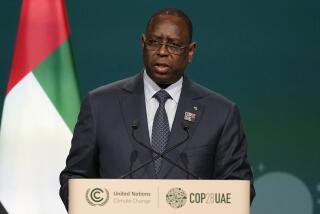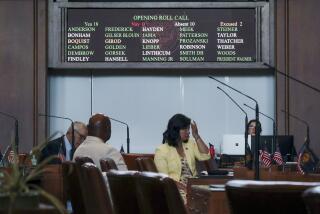Iraq secular bloc suspends campaign
- Share via
Reporting from Baghdad — A leading coalition supported by Sunnis and secularists suspended campaigning Saturday and hinted at a possible boycott of next month’s elections to protest a decision to uphold a ban on candidates because of their alleged ties to the outlawed Baath Party.
The Iraqi National Movement coalition headed by former Prime Minister Iyad Allawi announced that it would temporarily suspend its campaign and demanded action to reverse the bans on those being linked to the party that ruled under Saddam Hussein.
The group called for an urgent meeting of top leaders, a review of the banning process and an emergency session of parliament.
“This situation raises serious questions about the usefulness of the coming elections, whose results some in the political arena wish to predetermine through intimidation, blackmail, creation of crises and the sowing of chaos,” a statement by the coalition said.
Most observers think a Sunni Arab election boycott unlikely, because the last such boycott, in January 2005, left the Sunni minority shut out of power. But the monthlong dispute over the banned candidates has already plunged Iraq into political turmoil in the weeks before elections that U.S. officials hope will stabilize the country enough for American troops to go home.
The list of candidates who were barred after appeals was shorter than anticipated because most of the 454 who had been banned did not appeal. Of the 171 appeals to the disbarments, which had been ordered by the powerful Accountability and Justice Commission, 145 were rejected and 26 were granted by a panel of judges created to hear the appeals, Iraq’s Independent High Electoral Commission said.
Among those barred were two prominent Sunni members of parliament, Saleh Mutlak and Dhafir Ani, who had been accused of making statements “promoting” the Baath Party
Judges earlier had ruled that all of the barred candidates should be allowed to run because the court did not have time to hear their appeals before the March 7 balloting. But that ruling was greeted with a storm of Shiite Muslim opposition. The judges backed down and said they would rule on the cases in time for the start of the campaign Friday.
In a reminder of the threat of violence hanging over the elections, small bombs exploded Saturday night outside the offices of five mostly Sunni political parties, including the one headed by Mutlak.
The attacks came a day after the purported leader of the Al Qaeda-affiliated militant group Islamic State of Iraq threatened to prevent the elections from going ahead “primarily by military means.”
In an audiotape posted on a militant website, Abu Omar al Baghdadi warned Sunnis against participating in the elections, which he said would only affirm the role of Sunnis as a minority in Iraq, leaving Shiites, “the agents of Iran, . . . more powerful and influential.”
Times staff writer Raheem Salman contributed to this report.
More to Read
Sign up for Essential California
The most important California stories and recommendations in your inbox every morning.
You may occasionally receive promotional content from the Los Angeles Times.










